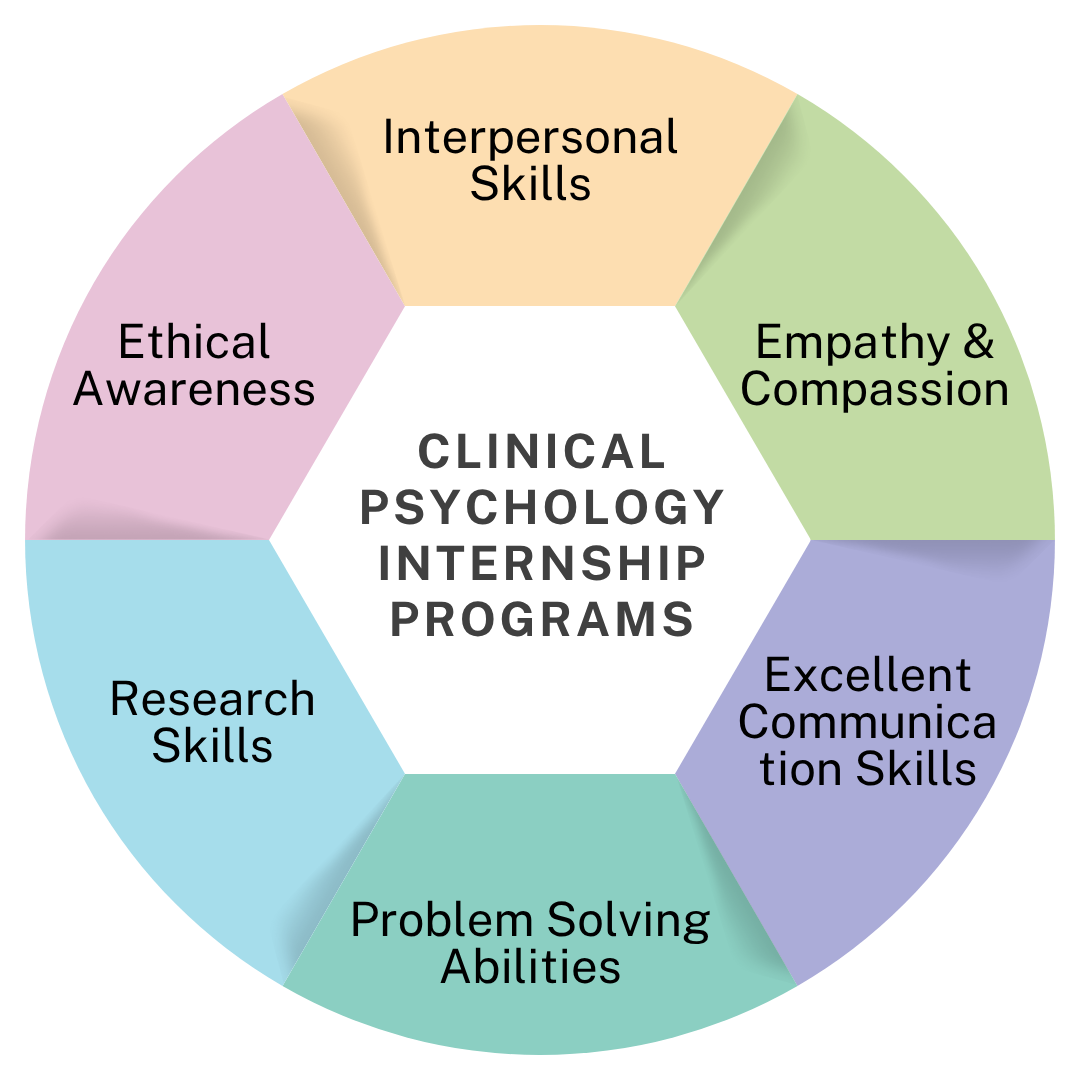She is a licensed Clinical & Rehabilitation Psychologist. She has been trained at the Institute of Psychiatry – Centre of Excellence, Kolkata (IPGMER SSKM Hospital), and PGDRP in Rehabilitation Psychology from the University Of Calcutta (RCI), Currently attached to Government Hospitals. She has worked in both academics and clinical fields, which include Neuropsychiatric clinics, psychological treatment centers, de-addiction cum rehabilitation centers, schools, and NGOs. She has also been a former lecturer at the University of Calcutta.
Clinical Psychology Internship Programs
Our versatile Clinical Psychology Internship Program prepares you for real-world success. Develop practical skills, collaborate with established professionals, and launch your career.

Aspiring Clinical Psychologists, Mental Health Therapist, Psychology Enthusiasts, Teachers
1.5 Month
Interaction Based Online Classes
- Certificate
- Letter of Recommendation
- Grade Sheet
Clinical Psychology Internship by Indian Counselling Services aims to fill the gap between theoretical knowledge and practical application. Our program is best for candidates who want rigorous evidence-based assessment and treatment training. This allows you to learn under trained RCI-licensed psychologists’ supervision and assess the implemented interventions effectively. We offer an excellent platform for learning about different disorders based on ICD and DSM criteria through case studies, workshops, monthly training, and research work.
Clinical psychology courses is one of the principal subfields of psychology, focusing on the research, diagnosis, and treatment of serious emotional, psychological, and behavioral problems such as delinquency, depression, and drug addiction. Clinical psychologists do not have medical training. They gather complete data on a client through approaches such as psychological exams, interviews, case studies, and so on. They utilize therapeutic strategies to assist clients in dealing with their problems. They work at hospitals, clinics, and other healthcare facilities.
A Clinical Psychologist uses a variety of treatments, including psychotherapy, to assist clients in coping with concerns such as anxiety and relationship problems. They may also provide psychiatric tests, advise, and create treatment plans. Some clinical psychologists focus on specific populations, such as children or older people. Their work attempts to improve psychological well-being.
Psychology internships, particularly clinical psychology courses, provide valuable real-world experience by bridging the gap between academic theory and practical application. Clinical psychology internships can improve career chances by expanding professional networks, providing access to research opportunities, and increasing applicants’ competitiveness in the job market or graduate schools.
Our Clinical Psychology Internship Offers You
Our Clinical Psychology Internship Program establishes a strong foundation in evidence-based assessment and intervention procedures. Interns will learn how to conduct complete psychological evaluations, create individualized treatment plans, and execute a variety of therapeutic modalities, including cognitive-behavioral therapy, psychodynamic methods, and mindfulness-based therapies. Supervision and mentorship are critical components that ensure interns receive advice and assistance in their professional development.
- Lifetime Access To Study Materials
- E- Certificate / Hard Copy
- Letter of Recommendation
- Lifetime Learning Support
- Job Opportunities
- Online Resources
- Recorded Classes
- Get Identity Card
- Startup Support
- 24/7 Chat Facility
- Get Notified Before Classes
- Constant Academic Counsellor Support
Explore Our Government-Recognized Accredited Courses
Learn more about the fascinating realm of human behavior with our broad range of psychology courses. Whether you are looking for short-term or long-term diploma courses, we will provide valuable insights and practical applications to help you reach great heights in the future.







See What Our Students Are Saying
EXCELLENTTrustindex verifies that the original source of the review is Google. The session was informative and highly useful. The overall journey of the Psychotherapy Practical Program was a great learning experience, providing valuable insights and a deeper understanding of therapeutic processes.Posted onTrustindex verifies that the original source of the review is Google. I took the "Counselling Practical Internship" in ICS and it was very good and informative. The ICS team and the educatocator who taught us were very helpful and provided us the sustainable meterials for future studies and life. Thank you.Posted onTrustindex verifies that the original source of the review is Google. Highly motivated and inspiring educators. Akriti Khosla was especially brilliant!Posted onTrustindex verifies that the original source of the review is Google. Great session 👍🏻 Each activity nicely explained. It was a great learning experience.Posted onTrustindex verifies that the original source of the review is Google. Great course, teaching and non teaching staff are supportive, good material and we are given the lifetime access to all the materialPosted onTrustindex verifies that the original source of the review is Google. Good teachers and get to depth of thingsPosted onTrustindex verifies that the original source of the review is Google. I recently completed the Counseling Practical Internship and found it extremely valuable and enriching. The course provided strong practical exposure to various psychological techniques, assessments, and therapeutic skills.Posted onTrustindex verifies that the original source of the review is Google. My experience learning psychology in ICS has been really good and enriching. The course helped me understand human behaviour, thoughts, and emotions clearly and interestingly. I especially appreciate Sonali Ma'am for explaining the concepts with real-life examples, making them more practical and relatable. Overall, studying psychology in ICS has improved my understanding of people and enhanced my analytical and thinking skills.
Meet Your Trainers For This Course

“CLINICAL AND REHABILITATION PSYCHOLOGIST (RCI-Licensed)”
FAQ (Frequently Asked Questions)
What is a Clinical Psychology Internship Program?
A Clinical Psychology Internship Program is a structured training opportunity for students and professionals in psychology to gain hands-on experience in clinical settings. It allows participants to apply theoretical knowledge, develop practical skills, and work under the supervision of experienced psychologists in areas such as psychological assessment, therapy, counselling, and research.
What are the benefits of doing a Clinical Psychology Internship Program online?
An online Clinical Psychology Internship Program offers several benefits, including:
- Flexibility – Learn at your own pace from anywhere.
- Access to Experts – Receive guidance from experienced psychologists through virtual sessions.
- Diverse Learning Opportunities – Engage in case studies, role-playing exercises, and simulated counseling sessions.
- Certification – Earn a recognized certificate upon completion to enhance your resume.
- Cost-Effective – Save on travel and accommodation expenses compared to in-person internships.
What will I learn in this Clinical Psychology Internship Program?
The program typically covers:
- Basics of clinical psychology and mental health disorders.
- Psychological assessment techniques and diagnostic tools.
- Therapy and counseling approaches (e.g., CBT, DBT, psychoanalysis).
- Ethics and professional conduct in clinical practice.
- Case study analysis and practical client interaction skills.
- Research methodologies in clinical psychology.
How can I register for this course?
You can enroll in this course by clicking the “Enroll Now” button or visiting our website and following the registration process.
